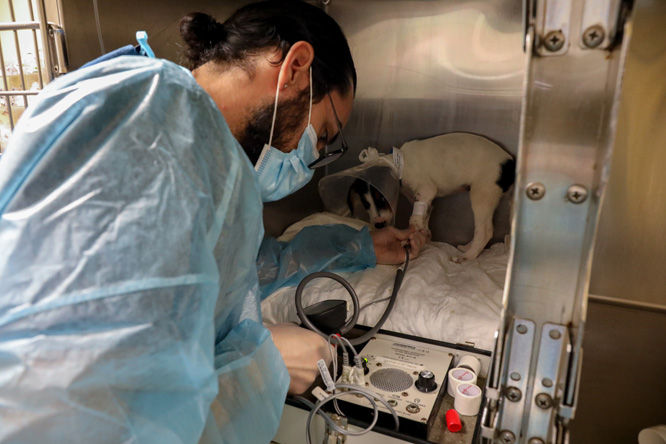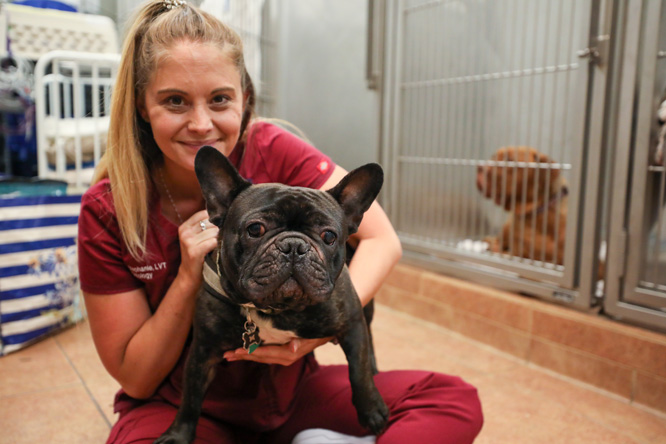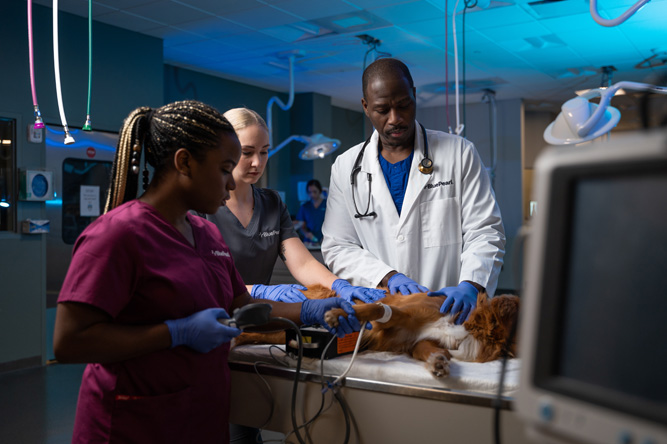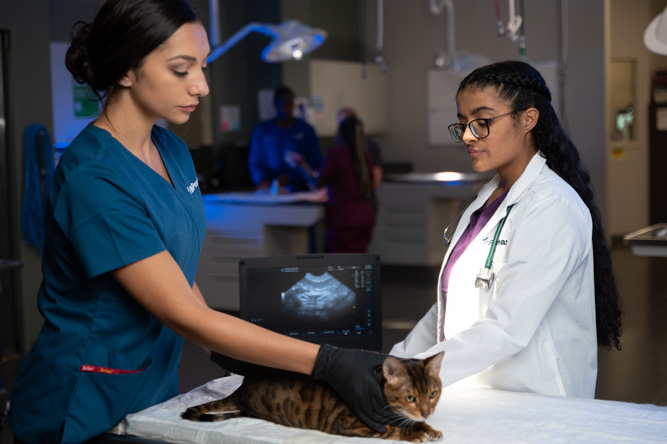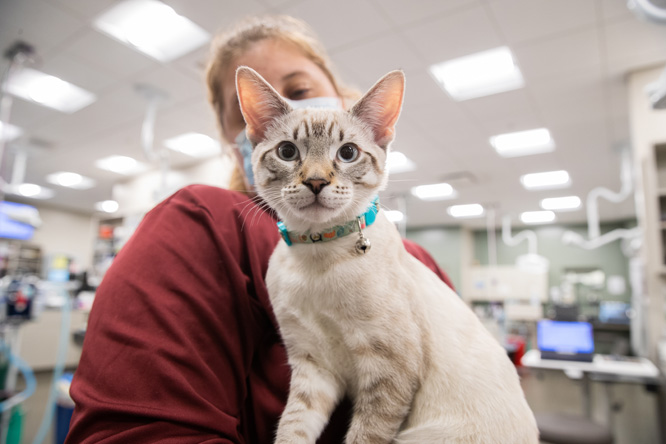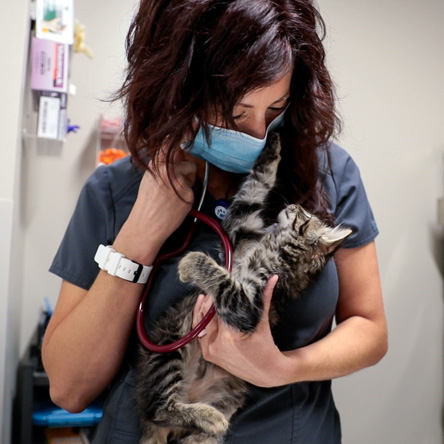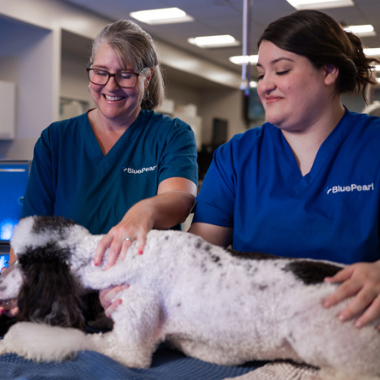Pet critical care by BluePearl.
Pet emergencies can be scary – we’re here to help you handle them.
We understand that seeing your pet sick, hurt or in distress can be stressful – especially if you don’t know what’s wrong. Fortunately, our experienced critical care clinicians are prepared to take action to provide lifesaving care

Conditions we treat.
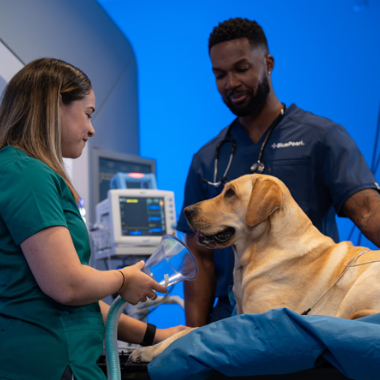
If your pet is experiencing a critical condition, you’ll have an entire veterinary team helping them so you can get back to what matters most – spending precious moments together.
Common cases that we see in the ICU include:
- Post-surgery recovery
- Trauma
- Sepsis
- Respiratory distress
- Pneumonia
- Shock
Services we offer.
Your pet will receive unparalleled medical care during their time at the hospital (and they’ll be spoiled with love and attention, too).
Advanced diagnostics
Your pet can’t tell us what’s wrong, so we use sophisticated diagnostics and imaging tools to uncover the source of the problem.
- Blood/urine testing
- Electrocardiography (ECG)
- Endoscopy
- Ultrasound
- Radiography (x-rays)
Treatment plans
Just as no two patients are the same, neither are their treatment plans. Our critical care team has experience with a range of advanced procedures and minimally invasive care options to get your pet on the path to wellness, including:
- Blood transfusions
- Electrolyte replenishment
- Oxygen therapy
- Breathing support
- Catheterization
- Nutritional support
- IV fluid therapy
Our board certified specialists and critical care team.
Experience makes all the difference.
Our critical care team is made up of veterinarians, vet technicians and assistants, and support staff with rigorous training and experience in specialty medicine. The team works hand in hand to provide the comprehensive, compassionate care your pet needs and deserves. Because we’re a multidisciplinary hospital, the team can consult the expertise of other specialty departments, too.
Kelsey Casey
DVM, DACVECCWithin the critical care field, Dr. Kelsey Casey particularly enjoys treating respiratory disease, polytrauma, sepsis, blood dyscrasias and Addison’s disease.
- Diplomate, American College of Veterinary Emergency & Critical Care
- Residency, Emergency and Critical Care, Pittsburgh Veterinary Specialty and Emergency Center, PA
- Internship, Emergency and Critical Care, Pittsburgh Veterinary Specialty and Emergency Center, PA
- Clinical Rotation, Colorado State University, Fort Collins
- Doctor of Veterinary Medicine, Ross University, St. Kitts & Nevis, West Indies
- Bachelor of Arts, Biology, Colby College, Waterville, ME
Dr. Casey and her husband have one daughter and a house full of pets: golden retriever Louie, Portuguese water dog Splash, coconut retriever Dee and tuxedo cat Jax.
Samuel Durkan
DVM, DACVECCDr. Sam Durkan’s particular clinical interests include trauma, emergency surgery, sepsis, coagulation, endocrine emergencies and mechanical ventilation.
- Diplomate, American College of Veterinary Emergency & Critical Care
- Residency, Emergency & Critical Care, Tufts University, North Grafton MA
- Internship, Small Animal Medicine & Surgery, Rochester Veterinary Specialists, NY
- Clinical Rotation, North Carolina State University, Raleigh
- Doctor of Veterinary Medicine, Ross University, St. Kitts & Nevis, West Indies
Away from the hospital, Dr. Durkan enjoys hiking, biking, water sports, yoga and is an avid motorcyclist. He and his wife have two children and two dogs.
Abigail Fosdick
MS, DVMDr. Abigail Fosdick understands the importance of communicating with clients to help them make the best decisions for their pets.
- Internship, Shelter Medicine, San Diego Humane Society, San Diego, CA
- Doctor of Veterinary Medicine, University of California, Davis, Davis
- Master of Science, Michigan State University, East Lansing
- Bachelor of Science, Animal Science, Rutgers University, New Brunswick, NJ
Dr. Fosdick enjoys spending time at home with her rescue pets, five cats and three dogs.
Michelle Fulks
DVM, DACVECCExperienced in all aspects of emergency and critical care medicine, Dr. Michelle Fulks is particularly interested in transfusion medicine and coagulopathies, or conditions in which the blood’s ability to clot is impaired.
- Diplomate, American College of Veterinary Emergency & Critical Care
- Residency, Emergency & Critical Care, Cape Cod Veterinary Specialists, Buzzards Bay, MA
- Internship, Small Animal Medicine & Surgery, Angell Animal Medical Center, Boston, MA
- Doctor of Veterinary Medicine, Colorado State University, Ft. Collins
- Bachelor of Science, Veterinary Science, University of Arizona, Tucson
Dr. Fulks enjoys cooking, hosting dinner parties and exploring the outdoors. She has a dog and cat.
Christina Genareo
DVMDr. Christina Genareo finds trauma and toxicity cases the most gratifying to treat.
- Residency, Emergency & Critical Care, Cape Cod Veterinary Specialists, Buzzards Bay, MA
- Internship, Small Animal Medicine & Surgery, Pittsburgh Veterinary Specialty & Emergency Center, Pittsburgh, PA
- Doctor of Veterinary Medicine, Western University of Health Sciences, Pomona, CA
- Bachelor of Science, Biology, Grove City College, Grove City, PA
Dr. Genareo has an elderly cat named Subaru who was found as a kitten near a car motor.
Meredith Maczuzak
DVMDr. Meredith Maczuzak’s clinical interests include polytrauma, parvoviral infections and acute abdominal syndrome.
- Residency, Emergency & Critical Care, University of Pennsylvania, Philadelphia
- Internship, Small Animal Medicine & Surgery, Southpaws Veterinary Specialists & Emergency Center, Fairfax VA
- Doctor of Veterinary Medicine, University of Georgia, Athens, GA
- Bachelor of Science, West Virginia University, Morgantown, WV
Dr. Maczuzak has a black cat she calls Dr. Tipper Bruce, PhD, an expert in seasonal conifers and décor. Her great Dane is Sir Lloyd Von Maczuzak.
Shaina Mooshian
DVM, DACVECCDr. Shaina Mooshian particularly enjoys transfusion medicine, mechanical ventilation, and treating sepsis and traumatic brain injuries.
- Diplomate, American College of Veterinary Emergency & Critical Care
- Residency, Emergency & Critical Care, Pittsburgh Veterinary Specialty and Emergency Center, PA
- Internship, Emergency & Critical Care, Pittsburgh Veterinary Specialty and Emergency Center, PA
- Internship, Small Animal Medicine & Surgery, Pittsburgh Veterinary Specialty and Emergency Center, PA
- Clinical Rotation, Louisiana State University, Baton Rouge
- Doctor of Veterinary Medicine, Ross University, St. Kitts & Nevis, West Indies
- Bachelor of Science, Biology, Lebanon Valley College, Annville, PA
Dr. Mooshian loves to sing, and enjoys traveling, cooking and gardening. Her pets include dogs Ripley, Eros and Apollo; cats Khaos and Raja; and rats Odin, Ramses, Maui and Loki.
Danna Torre
DVM, DACVECCDr. Danna Torre’s particular clinical interests include transfusion medicine and mechanical ventilation. She also finds it rewarding to treat coagulation disorders and immune-mediated diseases.
- Diplomate, American College of Veterinary Emergency & Critical Care
- Residency, Emergency & Critical Care, Tufts University, Medford MA
- Internship, Small Animal Medicine & Surgery, Red Bank Veterinary Hospital, Tinton Falls NJ
- Doctor of Veterinary Medicine, Tufts University, Medford MA
- Bachelor of Science, Biology, Binghampton University, NY
Dr. Torre enjoys exercise classes. She and her husband have two children and three brachycephalic (short-snouted) dogs.
What to expect.
We want you to be prepared for your pet’s visit to the ICU, so you have one less thing to worry about. Our entire BluePearl team will be with you every step of the way.
How the ICU works
First, your pet will be triaged and cared for by our emergency medicine team. If they require hospitalization, your pet will be seamlessly transferred to the ICU, where our critical care team will stabilize and monitor them around the clock.
We know how difficult it is to be separated from your pet during this critical time, so we’ll keep you updated on their condition and continue to discuss testing and treatment options with you. Once your pet is stable, you’ll be able to give them more love and attention during visiting hours.
Our team will continue to partner with your primary veterinarian as part of the ongoing management of your pet’s care.
You know your pet better than anyone, and you play a crucial role in any follow-up treatment necessary. If you have any concerns about providing care at home after being discharged from the hospital (such as giving medication or monitoring your pet’s symptoms), let us know – we’re here for you.
